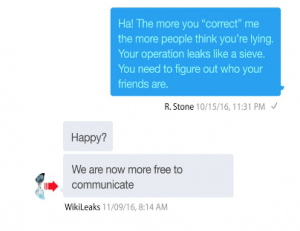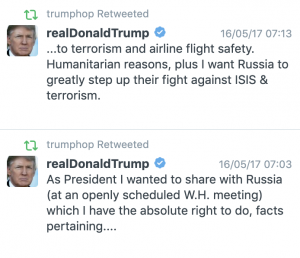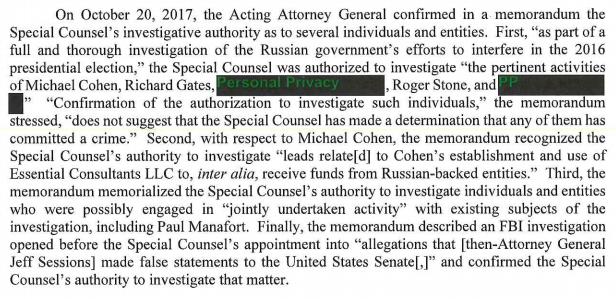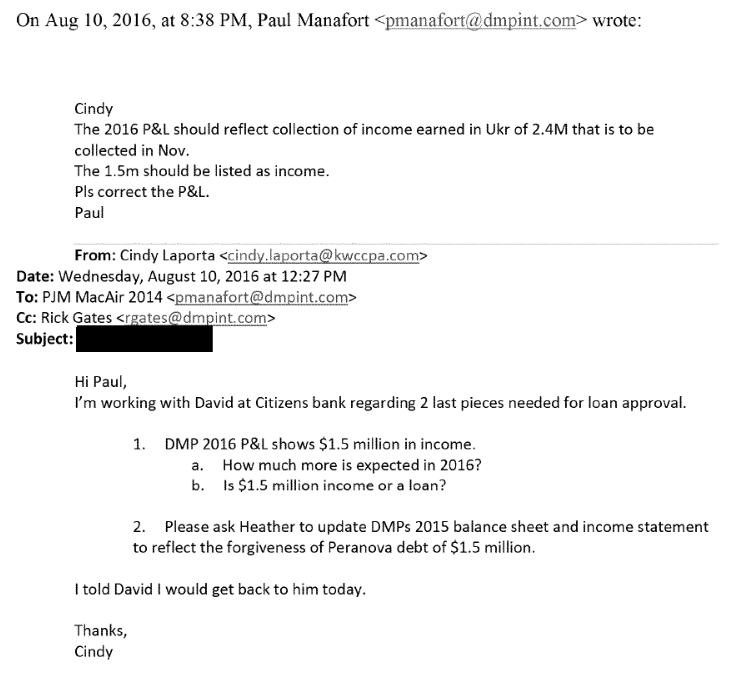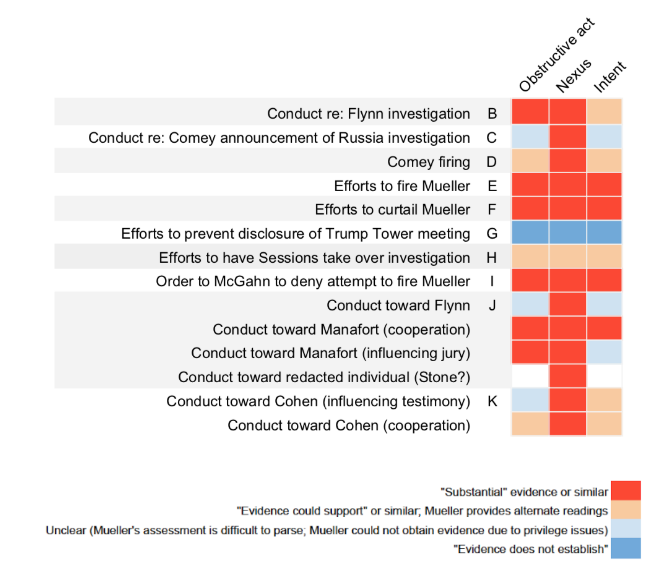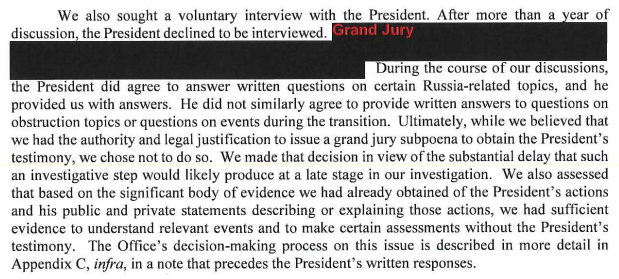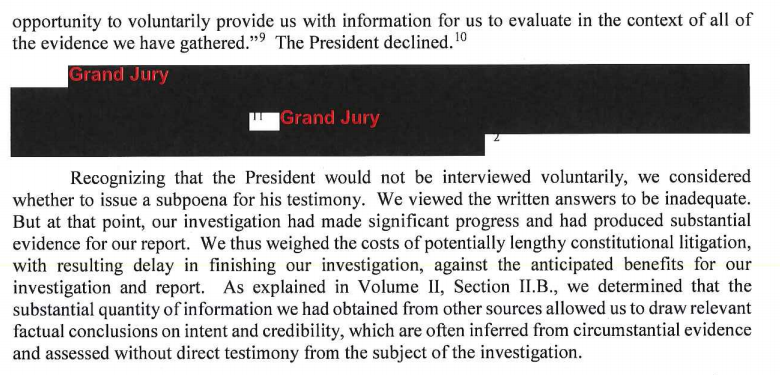The Mueller Report does not include the investigation’s counterintelligence analysis. It says that explicitly here (see also this Ben Wittes report, though I think he gets a few things wrong).
From its inception, the Office recognized that its investigation could identify foreign intelligence and counterintelligence information relevant to the FBI’s broader national security mission. FBI personnel who assisted the Office established procedures to identify and convey such information to the FBI. The FBI’s Counterintelligence Division met with the Office regularly for that purpose for most of the Office’s tenure. For more than the past year, the FBI also embedded personnel at the Office who did not work on the Special Counsel’s investigation, but whose purpose was to review the results of the investigation and to send-in writing-summaries of foreign intelligence and counterintelligence information to FBIHQ and FBI Field Offices. Those communications and other correspondence between the Office and the FBI contain information derived from the investigation, not all of which is contained in this Volume. This Volume is a summary. It contains, in the Office’s judgment, that information necessary to account for the Special Counsel’s prosecution and declination decisions and to describe the investigation’s main factual results. [my emphasis]
These FBI Agents were only co-located for part of Mueller’s tenure, perhaps around the same time as the IRA indictment? And this description does not include the three NSD prosecutors described as detailees, Heather Alpino, Ryan Dickey, and Jessica Romero, as distinct from prosecutors originally assigned to Mueller.
Plus, we know there was always a counterintelligence focus to this investigation; all the initial subjects of it (Manafort, Page, Papadopoulos, and Flynn) were counterintelligence concerns. Other Trump associates got added in October 2017, but even there, the investigation into Michael Cohen started as a FARA investigation and Gates and probably others were brought in along with Manafort’s counterintelligence concerns. Then there’s Trump (who must have been brought in for obstruction, but I don’t think the report says how).
But the most significant thing that doesn’t show up in this report is whether Trump was undercutting the investigation as a favor to Russia, reportedly one of the concerns Rod Rosenstein had when he first hired Mueller. This report does not explicitly treat that concern, at all (to significant detriment to one area of its analysis, as I’ll show in a follow-up post).
That’s most evident in the way the report deals with Vladimir Putin in the post-inauguration period. The report itself invokes Putin at least 163 times, often describing the many different efforts to set up a meeting between Putin and Trump. But when Trump actually started meeting with top Russian officials — and Putin specifically — the report gets quiet.
We finally get a read-out of the January 28 phone call
Start with the phone call between Trump and Putin on January 28, 2017. The report describes that setting up this call was among the things Mike Flynn spoke to Sergey Kislyak about.
Flynn discussed multiple topics with Kislyak, including the sanctions, scheduling a video teleconference between President-Elect Trump and Putin, an upcoming terrorism conference, and Russia’s views about the Middle East.
That Kislyak asked him to set up the call was actually something Flynn told the FBI the truth about in his interview with the FBI. More importantly, the report reveals several details that previous reporting about the George Nader channel did not: first, the role of Jared Kushner’s hedge fund buddy Rick Gerson in that back channel with Kirill Dmitriev, and the role that a “reconciliation plan” that Dmitriev got to Kushner via Gerson played in that January 28 meeting.
On January 16, 2017, Dmitriev consolidated the ideas for U.S.-Russia reconciliation that he and Gerson had been discussing into a two-page document that listed five main points: (1) jointly fighting terrorism; (2) jointly engaging in anti-weapons of mass destruction efforts; (3) developing “win-win” economic and investment initiatives; (4) maintaining an honest, open, and continual dialogue regarding issues of disagreement; and (5) ensuring proper communication and trust by “key people” from each country. 1111 On January 18, 2017, Gerson gave a copy of the document to Kushner. 1112 Kushner had not heard of Dmitriev at that time. 1113 Gerson explained that Dmitriev was the head of RDIF, and Gerson may have alluded to Dmitriev’s being well connected. 1114 Kushner placed the document in a file and said he would get it to the right people. 1115 Kushner ultimately gave one copy of the document to Bannon and another to Rex Tillerson; according to Kushner, neither of them followed up with Kushner about it. 1116 On January 19, 2017, Dmitriev sent Nader a copy of the two-page document, telling him that this was “a view from our side that I discussed in my meeting on the islands and with you and with our friends. Please share with them – we believe this is a good foundation to start from.” 1117
Gerson informed Dmitriev that he had given the document to Kushner soon after delivering it. 1118 On January 26, 2017, Dmitriev wrote to Gerson that his “boss”-an apparent reference to Putin-was asking if there had been any feedback on the proposal. 1119 Dmitriev said, ” [w]e do not want to rush things and move at a comfortable speed. At the same time, my boss asked me to try to have the key US meetings in the next two weeks if possible.”1120 He informed Gerson that Putin and President Trump would speak by phone that Saturday, and noted that that information was “very confidential.”1121
The same day, Dmitriev wrote to Nader that he had seen his “boss” again yesterday who had “emphasized that this is a great priority for us and that we need to build this communication channel to avoid bureaucracy.” 1122 On January 28, 2017, Dmitriev texted Nader that he wanted “to see if I can confirm to my boss that your friends may use some of the ideas from the 2 pager I sent you in the telephone call that will happen at 12 EST,”1123 an apparent reference to the call scheduled between President Trump and Putin. Nader replied, “Definitely paper was so submitted to Team by Rick and me. They took it seriously!”1124 After the call between President Trump and Putin occurred, Dmitriev wrote to Nader that “the call went very well. My boss wants me to continue making some public statements that us [sic] Russia cooperation is good and important.” 1125 Gerson also wrote to Dmitriev to say that the call had gone well, and Dmitriev replied that the document they had drafted together “played an important role.” 1126 [my emphasis]
This was a meeting that the US side provided just a terse readout of (and, if I remember correctly, only after Russia released its readout). 27 months later, we’re learning that Dmitriev (whose bank was of questionable status because of sanctions) and convicted pedophile Nader were prepping the meeting less than an hour before it began (the report cites text messages between them from 11:05 and 11:11 AM the morning of the 12PM meeting, as well as texts involving Gerson). Between them, the two of them plus Gerson (none of whom had clearance) had a better sense of how the meeting went than the American public. Among the things they learned — but we did not — was that part of the reconciliation plan included “win-win” economic and investment initiatives pitched by the head of RDIF.
The lead-up to this meeting is the subject about which Steve Bannon and Erik Prince mysteriously lost the encrypted texts they exchanged discussing it.
While the report does describe this meeting in its assessment of links between Russians and Trump associates, it doesn’t focus on how it lines up with questions about firing Mike Flynn.
The correlation of Trump’s decision to fire Comey and his conversation with Putin
The report gets still more coy when it describes the role of a meeting with Sergey Lavrov and Sergey Kislyak the day after Trump fired Jim Comey. One of the most pregnant footnotes in the report (h/t Laura Rozen) notes that the May 10, 2017 meeting was planned in a call between Putin and Trump and confirmed the day Trump first dictated the Comey termination at Bedminster Golf Course.
468 SCR08_000353 (5/9/17 White House Document, “Working Visit with Foreign Minister Sergey Lavrov of Russia”); SCR08_001274 (5/10/17 Email, Ciaramella to Kelly et al.). The meeting had been planned on May 2, 2017, during a telephone call between the President and Russian President Vladimir Putin, and the meeting date was confirmed on May 5, 2017, the same day the President dictated ideas for the Comey termination letter to Stephen Miller. SCR08_001274 (5/10/17 Email, Ciaramella to Kelly et al.).
According to Don McGahn, in the leadup to Comey’s May 3 testimony to Congress, Trump told him that if Comey did not confirm that Trump was not under investigation it would “be the last straw” because it was “hurting his ability to … deal with foreign leaders.”
McGahn recalled that in the week leading up to the hearing, the President said that it would be the last straw if Comey did not take the opportunity to set the record straight by publicly announcing that the President was not under investigation.384 The President had previously told McGahn that the perception that the President was under investigation was hurting his ability to carry out his presidential duties and deal with foreign leaders.385
Trump brought up Comey at least 8 times with Bannon in the following two days, and Bannon warned Trump not to fire Comey.
Bannon recalled that the President brought Comey up with him at least eight times on May 3 and May 4, 2017 .399 According to Bannon, the President said the same thing each time: “He told me three times I’m not under investigation. He’s a showboater. He’s a grandstander. I don’t know any Russians. There was no collusion.”400 Bannon told the President that he could not fire Comey because “that ship had sailed.”401 Bannon also told the President that firing Comey was not going to stop the investigation, cautioning him that he could fire the FBI director but could not fire the FBI.402
On the 5th — the day (the report helpfully notes) the Russian meeting was confirmed — Trump dictated to Stephen Miller to start Comey’s termination letter by stating that the Trump-Russia story was fabricated.
[T]he President told Miller that the letter should start, “While I greatly appreciate you informing me that I am not under investigation concerning what I have often stated is a fabricated story on a Trump-Russia relationship – pertaining to the 2016 presidential election, please be informed that I, and I believe the American public – including Ds and Rs – have lost faith in you as Director of the FBI.”
Trump prohibited Miller from telling anyone at the White House about his plan to fire Comey.
All that would lead you to believe the report might make further note about this correlation, about the appearance (which had already been suggested, but the report makes far more clear) that Trump took action in advance of that meeting.
It doesn’t really. The description of the meeting does make clear that, in the wake of Trump’s comments to Lavrov boasting about firing Comey, the White House released a statement that incorporated and expanded on the language about Comey’s grandstanding from finalized Miller letter drafted at Bedminster.
In the morning on May 10, 2017, President Trump met with Russian Foreign Minister Sergey Lavrov and Russian Ambassador Sergey Kislyak in the Oval Office.468 The media subsequently reported that during the May 10 meeting the President brought up his decision the prior day to terminate Comey, telling Lavrov and Kislyak: “T just fired the head of the F.B.I. He was crazy, a real nut job. I faced great pressure because of Russia. That’s taken off. … I’m not under investigation.”469 The President never denied making those statements, and the White House did not dispute the account, instead issuing a statement that said: “By grandstanding and politicizing the investigation into Russia’s actions, James Comey created unnecessary pressure on our ability to engage and negotiate with Russia. The investigation would have always continued, and obviously, the termination of Comey would not have ended it. Once again, the real story is that our national security has been undermined by the leaking of private and highly classified information.”470 Hicks said that when she told the President about the reports on his meeting with Lavrov, he did not look concerned and said of Comey, “he is crazy.”471 When McGahn asked the President about his comments to Lavrov, the President said it was good that Comey was fired because that took the pressure off by making it clear that he was not under investigation so he could get more work done.472 [my emphasis]
What the report doesn’t mention, at all, is that Trump shared sensitive Israeli intelligence with the Russians at this meeting, an obvious counterintelligence concern.
Trump’s secret co-author on the June 9 meeting statement
An even more remarkable silence in the report pertains to the conversation Trump had with Putin at the G20 while his team was working on drafting the statement about the June 9 meeting.
The description of Trump’s actions on this matter are fairly superlative, with Hope Hicks describing Trump in what is best described as denial, refusing to be included in conversations about it, yet strongly suggesting that it was Trump making the comment — suggesting they could withhold the damning emails — that Mark Corallo later attributed to her. Hicks even describes Trump as committing what he considered the ultimate sin, not commenting on a story.
On July 7, 2017, while the President was overseas, Hicks and Raffel learned that the New York Times was working on a story about the June 9 meeting.695 The next day, Hicks told the President about the story and he directed her not to comment.696 Hicks thought the President’s reaction was odd because he usually considered not responding to the press to be the ultimate sin.697
The report then describes how (in what would have been in the wake of Trump’s first face-to-face meeting with Putin) Trump instructed her to claim the meeting was just about adoptions. It then describes Trump dictating a statement, watering down the offer of dirt to just adoptions, something that not even Don Jr was willing to put out.
Later that day, Hicks and the President again spoke about the story.698 Hicks recalled that the President asked her what the meeting had been about, and she said that she had been told the meeting was about Russian adoption.699 The President responded, “then just say that.”700
On the flight home from the G20 on July 8, 2017, Hicks obtained a draft statement about the meeting to be released by Trump Jr. and brought it to the President.701 The draft statement began with a reference to the information that was offered by the Russians in setting up the meeting: “I was asked to have a meeting by an acquaintance I knew from the 2013 Miss Universe pageant with an individual who I was told might have information helpful to the campaign.”702 Hicks again wanted to disclose the entire story, but the President directed that the statement not be issued because it said too much.703 The President told Hicks to say only that Trump Jr. took a brief meeting and it was about Russian adoption.704 After speaking with the President, Hicks texted Trump Jr. a revised statement on the June 9 meeting that read:
It was a short meeting. I asked Jared and Paul to stop by. We discussed a program about the adoption of Russian children that was active and popular with American families years ago and was since ended by the Russian government, but it was not a campaign issue at that time and there was no follow up. 705
Hicks’s text concluded, “Are you ok with this? Attributed to you.”706 Trump Jr. responded by text message that he wanted to add the word “primarily” before “discussed” so that the statement would read, “We primarily discussed a program about the adoption of Russian children.”707 Trump Jr. texted that he wanted the change because “[t]hey started with some Hillary thing which was bs and some other nonsense which we shot down fast. “708 Hicks texted back, “I think that’s right too but boss man worried it invites a lot of questions[.) [U]ltimately [d]efer to you and [your attorney] on that word Be I know it’s important and I think the mention of a campaign issue adds something to it in case we have to go further.” 709 Trump Jr. responded, “lfl don’t have it in there it appears as though I’m lying later when they inevitably leak something.” 710
The passage mentions nothing about Trump’s meeting, with no American aides, with Putin at the G20 dinner in between the first discussion of a statement about adoptions and the one Trump drafted personally.
Nor does the report, in repeated discussions of Trump’s unplanned interview with the NYT at which he admitted discussing adoptions with Putin that night, mention that admission.
Within hours of the President’s meeting with Lewandowski on July 19, 2017, the President gave an unplanned interview to the New York Times in which he criticized Sessions’s decision to recuse from the Russia investigation.630 The President said that “Sessions should have never recused himself, and if he was going to recuse himself, he should have told me before he took the job, and I would have picked somebody else.”631 Sessions’s recusal, the President said, was “very unfair to the president. How do you take a job and then recuse yourself? If he would have recused himself before the job, I would have said, ‘Thanks, Jeff, but I can’t, you know, I’m not going to take you.’ It’s extremely unfair, and that’s a mild word, to the president.”632 Hicks, who was present for the interview, recalled trying to “throw [herself] between the reporters and [the President]” to stop parts of the interview, but the President “loved the interview.”633
[snip]
On July 19, 2017, the President had his follow-up meeting with Lewandowski and then met with reporters for the New York Times. In addition to criticizing Sessions in his Times interview, the President addressed the June 9, 2016 meeting and said he “didn’t know anything about the meeting” at the time.734 The President added, “As I’ve said-most other people, you know, when they call up and say, ‘By the way, we have information on your opponent,’ I think most politicians – I was just with a lot of people, they said … , ‘Who wouldn’t have taken a meeting like that?”‘735
Trump’s admission that he spoke to Putin about adoptions in the same interview where he prepared the ground to fire Sessions and insisted that everyone would take a meeting with foreigners offering dirt on your opponent would seem important to the discussion of whether in attempting to fire Sessions, Trump was obstructing not a criminal investigation into his own conduct, but a counterintelligence investigation into his own ties with Putin.
But the report not only doesn’t consider it, the report doesn’t mention it.
Nor does the report discuss some of the other bizarre Trump interactions with Putin, most of all the Helsinki meeting that took place in the wake of the release of the GRU indictment, leading Trump to yet again very publicly deny Russia’s role in the attack, that time in the presence of Putin himself.
Now, there may be very good constitutional reasons why the analysis of Trump’s weird relationship with Putin as President is not part of this report. The President is empowered with fairly unlimited authority to conduct foreign policy and to declassify information, which would cover these instances.
Plus, if Mueller conducted this analysis, you wouldn’t want to share that publicly so the Russians could read it.
But it must be noted that the report doesn’t answer what a lot of people think it does: whether Trump has been compromised by Russia, leading him to pursue policies damaging to US interests. Let me very clear: I don’t think Trump is a puppet being managed by Vladimir Putin. But contrary to a great number of claims that this report puts those concerns to rest, the report does the opposite. With the limited exception of the suggestion of a tie between firing Comey and the meeting with Lavrov, the report doesn’t even mention the key incidents that would be the subject of such analysis.
If anything, new details released in this report provide even further reason to think Trump obstructed the Russian investigation to halt the counterintelligence analysis of his ties with Russia. But the report itself doesn’t ever explicitly consider whether that’s why Trump obstructed this investigation.
Update: As TC noted, one thing the report does include is the detail that during a period he was trying to fire Sessions, Trump wanted him to limit Mueller’s mandate to future elections, which would have the effect of limiting the investigation into Russia’s crime as well as any potential exposure of his own.
During the June 19 meeting, Lewandowski recalled that, after some small talk, the President brought up Sessions and criticized his recusal from the Russia investigation.605
The President told Lewandowski that Sessions was weak and that if the President had known about the likelihood of recusal in advance, he would not have appointed Sessions.606 The President then asked Lewandowski to deliver a message to Sessions and said “write this down.” 607 This was the first time the President had asked Lewandowski to take dictation, and Lewandowski wrote as fast as possible to make sure he captured the content correctly.608 The President directed that Sessions should give a speech publicly announcing: I know that I recused myself from certain things having to do with specific areas. But our POTUS . .. is being treated very unfairly. He shouldn’t have a Special Prosecutor/Counsel b/c he hasn’t done anything wrong. I was on the campaign w/ him for nine months, there were no Russians involved with him. I know it for a fact b/c I was there. He didn’t do anything wrong except he ran the greatest campaign in American history.609
The dictated message went on to state that Sessions would meet with the Special Counsel to limit his jurisdiction to future election interference:
Now a group of people want to subvert the Constitution of the United States. T am going to meet with the Special Prosecutor to explain this is very unfair and let the Special Prosecutor move forward with investigating election meddling for future elections so that nothing can happen in future elections.610
emptywheel’s Mueller Report coverage
The Significance of Trump’s Obstruction of Investigation of His Family’s Campaign Finance Crimes, Plural
How “Collusion” Appears in the Mueller Report
Putin’s Ghost: The Counterintelligence Calculus Not Included in the Obstruction Analysis
Working Twitter Threads on the Mueller Report
The Trump Men and the Grand Jury Redactions
Mueller’s Language about “Collusion,” Coordination, and Conspiracy
The Many Lies and Prevarications of Bill Barr
As I disclosed last July, I provided information to the FBI on issues related to the Mueller investigation, so I’m going to include disclosure statements on Mueller investigation posts from here on out. I will include the disclosure whether or not the stuff I shared with the FBI pertains to the subject of the post.


